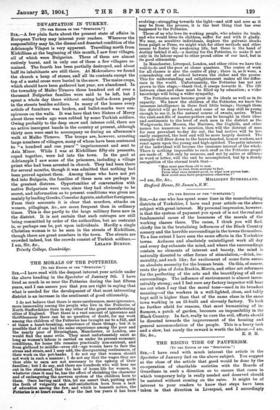DEVASTATION IN TURKEY.
[To THE EDITOR or TEl "SPECTATOR.."] SIR,—A few plain facts about the present state of affairs in European Turkey may interest your readers. Wherever the responsibility may lie, the dismal and deserted condition of the Adrianople Vilayet is very apparent. Travelling north from Kirkillisse at the beginning of this month, I saw four villages, all of which were Bulgarian. Three of them are almost entirely burnt, and in only one of these a few villagers re- mained. The fourth has been partially destroyed, and about half its inhabitants are still there. At Mokroshevo we found the church a heap of stones, and all its contents except the top of a metal cross were buried in the snow. The maize crops, which should have been gathered last year, are abandoned. In the township of Malko Tirnovo three hundred out of over a thousand Bulgarian families were said to be left, but I spent a whole day there without seeing half-a-dozen people in the streets besides soldiers. In many of the houses every article of furniture was broken, and bullet-marks were con- spicuous on the walls. It was here that two Sisters of Mercy about three weeks ago were robbed by some Turkish soldiers. Owing probably to the deep snow and intense cold, there are no active insurgent bands in the country at present, although thirty men were sent to accompany us during an afternoon's walk at Malko Tirnovo. The troops are, however, arresting large numbers of villagers, many of whom have been sentenced to "a hundred and one years' " imprisonment and sent to Asia Minor. While I was at Kirkillisse fifty-six peasants, roped together, were led into the town. In the gaol at Adrianople I saw some of the prisoners, including a village priest who had been arrested in church. They had been there for several months, though it was admitted that nothing had been proved against them. Among those who have not yet fled. into Bulgaria, the families of these men are perhaps in the greatest distress. Opportunities of conversation with native Bulgarians were rare, since they had obviously to be secret, and information as to present conditions was given me mainly by leading Greeks, Consular Agents, and other foreigners. From their accounts it is clear that murders, attacks on women, pillagings, &c., are more frequent than in ordinary times. This is due partly to the large military force now in the district. It is not certain that such outrages are still being committed by order of the authorities, but no restraint is, or perhaps can be, put upon individuals. Hardly a single Christian woman is to be seen in the streets of Kirkillisse, though there are great numbers in the town. The streets are crowded indeed, but the crowds consist of Turkish soldiers.—










































 Previous page
Previous page